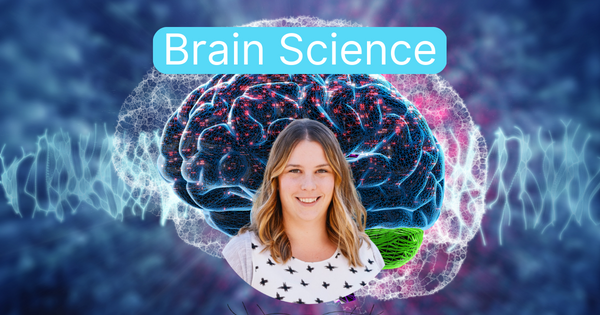
Deborah Pardes
@DBPardes · 1:51
Are you paying ATTENTION!? Can you focus on that question? First Stop: the Brain
I don't know. Please correct me. I hope you're well. And I want to jump in, obviously, because I see that you have a consultancy company, that you are in the business of explaining life to people like us. So I appreciate you taking the time out of your work to speak with us

Emma Louth Als
@ELouth · 2:44
And the next thing I knew, I was focusing on neuroscience, and all my research was about the brain and brain development, how our brain develops to be able to learn and pay attention and what can influence that

Marina S
@MarinainWonder · 1:15
And it doesn't matter, like, whether there's pictures on it or not. They're really engaged when it's something they like and there's a repetition. So I don't know too much about science or anything like that, but I do notice that if it's something that they're really intrigued by or they're very curious, that becomes like, a really big focus for them

Deborah Pardes
@DBPardes · 1:48
And it's why the video industry, the digital world, is so seductive and so attractive to young kids, probably because everything has the arc of drama, the arc of play, the tangible reward systems, the bright lights, the immersive experience. Those are all things that pull kids in in the digital space that really are big success stories

Emma Louth Als
@ELouth · 4:56
Hi, Deborah. I think you really hit the nail on the head here with what is the biggest concern to parents and people in the field of child brain development nowadays? And it's a really tough question. I mean, I'm home with my three month old right now and sure, it's easy enough for me to avoid screen time here at home, but what about when she goes to daycare or school and other kids have smartphones and iPads?

Deborah Pardes
@DBPardes · 1:58
For parents who are looking to really be active with their children, really side by side, supporting the fact that they're of a different generation, supporting what really are the demands of being young in this world and helping them along in succeeding. Do you have any tips, like a punch list for things that you've discovered from a neurological perspective for parents to see if their children are really suffering versus just a kid in the 21st century?

Aayan B
@aayanisms · 2:52
Any such new introduction to either technology or an art form or something new was always met with resistance, with problems, with the statements being the alternatives are always better and so on and so forth. Yet, because such inventions, discoveries, developments were so good, people got used to it, adapted to it. So people got used to mainstream television, then mainstream television crept into our everyday lives and they got used to it. Then came the computers. People got used to it then

Emma Louth Als
@ELouth · 2:01
It can sort of mess with your circadian rhythm a bit, and especially for kids, look and see, okay, are they using technology right before bed or do they even have their phone in bed with them? And maybe if they're not sleeping, try that first. Try getting the phone out of the bed and not having sort of the blue screens maybe a good hour or two before going to sleep. But, yeah, otherwise, unfortunately, I don't have an answer

Emma Louth Als
@ELouth · 2:03
That how we can use all the smart tech to be more productive and how we can integrate that into the workplace. And of course, it's met with a lot of resistance, and I think you're quite spot on there saying, will we just get used to it? In that sense, I think we will. In 515 years, whatever it may be, we're going to see more technology creeping into the adult life, for sure, and the workplace

Deborah Pardes
@DBPardes · 1:13
But because you look through life through that lens, I'm wondering if you personally have sleep hacks to help the brain do what it needs to do. Asking for a friend

Emma Louth Als
@ELouth · 3:34
And it can sort of stress you out and make it very difficult to fall asleep. So making some sort of routine that puts you in that mindset, that puts you in that more relaxed state, whether it's meditating or even just reading book, doing something else before bed, I would say those two things, consistency and routine, are going to be the things that make the biggest dent in trouble sleeping
Swell Team
@Swell · 0:15

Marina S
@MarinainWonder · 1:15
So we try to encourage for the parents kind of to do that at home as well. So there is, again, that consistency. So I definitely agree with that 100%. And as an adult myself, I would pretty much say that I actually have my own little bedtime routine too, because I want to make sure I get my 8 hours or even 7 hours, whatever works. But sometimes those things don't happen, of course

Deborah Pardes
@DBPardes · 0:38
Hey. I just want to agree with you about the routine aspect and echoing what Emma says. I think we have to just commit to it because the routine really does tell our cellular body that it's going to expect things at the right time in the right environment and get the right fuel it needs and nourishment, it needs and I'm going to say it out loud
